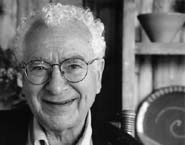| The Third Culture |
| |||||||
 The first thing that makes me respect Murray is that unlike all his contemporaries, including Feynman, Weinberg, Hawking, and all the other particle physicists, he saw that complexity is the next big problem. The kind of breakthroughs he made in the early 1960's in terms of impact on the world are not going to get made in that domain, they are going to get made in this domain. Murray recognized that, and has become more than just conversant with what's going on and with what the problems are.
J. Doyne Farmer There's nothing like having a Nobel laureate around to liven up discussions on almost any topic. Christopher G. Langton Murray is the greatest living American theoretical physicist. Lee Smolin
| Murray Gell-Mann "The Sante Fe Institute, which I helped to found in 1984, gathers together mathematicians, computer scientists, physicists, chemists, neurobiologists, immunologists, evolutionary biologists, ecologists, archaeologists, linguists, economists, political scientists, and historians, among others. The emphasis is on interactive people. Many distinguished scientists and scholars yearn to stray outside their own fields but can't do so easily at their own institutions. We didn't want to locate our institute near Harvard or Stanford, where there's enormous pressure of received ideas - ideas accepted by a whole community and therefore difficult to challenge. In Sante Fe, we can think and talk freely, constrained only by the need to agree with reality." Murray Gell-Mann is a theoretical physicist; Robert
Andrews Millikan Professor Emeritus of Theoretical Physics at the California Institute
of Technology; winner of the 1969 Nobel Prize in physics; a cofounder of the Santa
Fe Institute, where he is a professor and cochairman of the science board; a director
of the J.D. and C.T. MacArthur Foundation; one of the Global Five Hundred honored
by the U.N. Environment Program; a member of the President's Committee of Advisors
on Science and Technology; author of The
Quark and the Jaguar: Adventures in the Simple and the Complex. Further Reading: "Plectics" in The Third Culture.
|